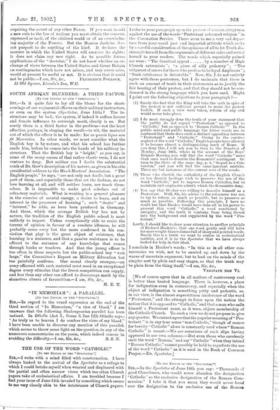THE USE OF THE WORD "CATHOLIC."
[To THE EDITOR OF THE "SPECTATOR."]
Snt,—I write with a mind filled with consternation. I have always looked to the arrival of the Spectator as a refuge to which I could betake myself when wearied and displeased with the partial and often narrow views which too often Church papers take of ecclesiastical affairs. I am troubled because I find your issue of June 14th invaded by something which seems to me very closely akin to the intolerance of Church papers. I refer to your paragraph upon the protest of certain clergymen against the use of the words "Protestant reformed religion" in the Coronation Service. These seem to me a very sad depar- ture from your usual just and impartial attitude which seeks by a careful consideration of the opinions of all to let Truth dis- entangle herself from the arguments of different sides and reveal herself to your readers. The words which especially pained me were : "The fanatical appeal by a number of High Church extremists"; "a piece of silly pedantry " ; " The vulgarest of errors for those who profess to be loyal Anglicans" ; "Such intolerance is detestable." Now, Sir, I do not entirely agree with these protesters, but I do maintain that there is such an amount of truth in their statements as to justify the fair hearing of their protest, and that they should not be con- demned in the strong language which you have used. Might I point out the following objections to your paragraph 9-
(1) Surely the fact that the King will take the oath in spite of the protest is not sufficient ground to make the protest foolish. If such a view were taken, reform of any evil would never take place.
(2) I do most strongly deny the truth of your statement that the public do not regard " Protestant ' as opposed to Catholic,' but as opposed to Roman Catholic.'" In the public mind and public language the latter words are so confused that there does exist a distinct opposition between "Protestant" and "Catholic." Owing to the careless neglect of the word "Catholic," English people have allowed it to become almost a distinguishing mark of Rome. It you deny this, I will ask you to turn to the Standard of Monday, • June 16th, where in the account of the Boys' Brigade Meeting you will find the word " Catholic " more than once used to describe the Romanists' contingent. Or turn to the Globe of the same day, p. 4, "Sequel to a Con- version," and you will find the same ignorant mistake. These are but instances of the current uses of the words.
Those who cherish the catholicity of the English Church as her dearest heritage wish to preserve the use of the word "Catholic," not to impress Roman Catholics, but to maintain and emphasise a truth which the Romanists deny.
(4) You say that Hooker was willing to describe • himself as a Protestant. Well, Sir, his advice to the reformers was not to try to reform as much as possible, but to preserve as much as possible. Following this principle, I have no doubt but that Hooker would have done all in his power to prevent this word "Catholic," a word sanctioned by antiquity, and the truth it contains from being thrust into the background and supplanted by the word "Pro- testant."
Lastly, I should like to draw your attention to another principle of Richard Hooker's : that one word gently said will have far more weight than volumes full of sharp and pointed words. &tidy this is a truth we want to realise in ecclesiastical matters, and it is to the Spectator that we have always looked for help in this ideal.
I conclude in Hooker's words : "In this as in all other con- troversies we wish, not to be carried up and down by the waves of uncertain argument, but to lead on the minds of the simpler sort by plain and easy stages, so that the truth may be plain from the thing itself."—I am, Sir, cf.:C.,
VERITA.TE NON VI.
[We of course agree that in all matters of controversy cool is better than heated language. There is, however, a place for indignation even in controversy, and especially when the object of indignation is something petty and pedantic, as, in our view, is the almost superstitious intolerance of the word "Protestant," and the attempt to force upon the nation the notion that it is opposed to "Catholic," and that a man who calls himself a Protestant must, as it were, abjure membership of the Catholic Church. To such a view we do not propose to give any quarter. We cannot agree that the popular meaning of" Pro- testant" is in any true sense " non-Catholic," though of course for brevity " Catholic" alone is constantly used where" Roman Catholic" is meant.—We are conscious of such slips having appeared in our own columns.—But even those who carelessly omit the word " Roman," and say "Catholic "when they intend "Roman Catholic," cannot possibly be held to repudiate the use of the word " Catholic " as it is used in the Book of Common Prayer.—En. Spectator.]






































 Previous page
Previous page